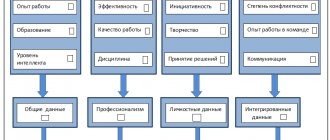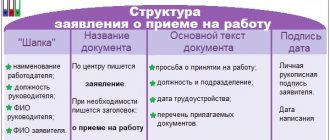Why are such questionnaires needed?
Job seekers are often perplexed: why fill out an application form for a job interview if the employer has already received a resume for review. It has been argued that a written employment questionnaire is useless because it can easily be replaced by an interview. But no, neither a resume nor an interview can be called a full-fledged replacement for a questionnaire. Since the candidate tries to present himself in the best light in his resume, he sometimes does not indicate unfavorable information (temporary jobs, presence of small children). The main purpose of a resume is to receive an invitation to an interview. As for the interview, this is the second stage of direct acquaintance between the employer and the future employee, and the first is a well-written questionnaire.
What benefits does a company receive before interviewing a candidate using questionnaires:
- general information determining the legality and expediency of further interaction with the applicant for the vacant position;
- an adequate initial assessment of his professional qualities, necessary for making a decision on admission.
For the applicant, this document is no less important. A potential employee learns a lot about future employment, and it often contains questions that are not answered in the resume. You won’t be able to dodge an awkward question without answering it in the questionnaire: the employer will ask it anyway.
Typically, a job application template contains a list of mandatory items (education, previous jobs, reasons for dismissal), which allow you to evaluate the candidate, his professional level and personal qualities more deeply. Looking through the information specified in the questionnaire, employers pay attention even to such little things:
- the applicant's literacy level;
- accuracy of filling;
- the amount of time spent filling out the questionnaire;
- completeness of the data provided;
- attentiveness, etc.
At the same time, HR assesses the emotionality and mood with which a person comes to an interview. Thus, the job application form reveals the social and psychological characteristics of the applicant, which simplifies the selection of candidates.
Sometimes the questionnaire is offered to be completed electronically, but the purpose of such a procedure is solely to collect information about the potential employee.
ConsultantPlus experts analyzed the situation: when hiring new employees, applicants’ questionnaires must be sent to the founders in France. Is it permissible to transfer personal data of Russian citizens outside the territory of the Russian Federation? Use these instructions for free.
Why do you need a candidate application form?
An employment questionnaire allows you to find out and clarify points of interest to the employer.
In a resume, a person tries to present himself in a favorable light, and is silent about what could negatively affect the decision to apply.
The hiring questionnaire will help you find out:
- whether the applicant has the right to occupy the proposed position, for example, does a criminal record limit the right to occupy certain positions;
- whether he has the necessary experience, knowledge, skills, characteristics for the proposed job.
You can add test questions to the questionnaire to create a psychological portrait of the applicant.
Even if the candidate does not pass the selection, the questionnaire will be used in the selection for other vacancies.
For whom is it required?
According to Order of the Government of the Russian Federation No. 667-r dated May 26, 2005, the application form must be filled out by citizens wishing to take part in competitions for filling places:
- state civil service;
- municipal service.
In all other cases, the questionnaire is not included in the number of documents required for employment (Article 65 of the Labor Code of the Russian Federation). Despite this, many businesses develop their own sample and use it to evaluate a candidate.
IMPORTANT!
All information about the applicant that is indicated in the document is confidential information and is not subject to public disclosure (Article 86 of the Labor Code of the Russian Federation). If confidentiality is violated, the employer will be held criminally liable. The one who processes the documents has access to personal data and is obliged to maintain confidentiality (Federal Law of the Russian Federation No. 152 “On Personal Data”, Article 6, paragraph 3). According to the law, the head of the enterprise is responsible to the state for the actions of the operator.
What questions does the questionnaire contain?
The form includes from 10 to 30 points on which the employer wants to receive information from a potential employee. Among them:
- FULL NAME. applicant for a vacancy;
- Date and place of birth;
- citizenship;
- address of actual residence and place of permanent registration;
- telephone, email address;
- passport details;
- education (including additional and courses);
- attitude towards military duty;
- availability of a medical book;
- information about work activity for a certain period of time (place and period of work, position, responsibilities, salary);
- professional skills and abilities;
- marital status and information about close relatives;
- hobby;
- character strengths and weaknesses;
- wishes for working conditions and salary;
- having a driver's license;
- level of foreign languages and PC proficiency;
- presence of chronic diseases;
- recommendations from former employers.
If you want the employer profile to be as informative as possible, the questions should be formulated clearly and concisely. Then the answers to them will be the same.
Enterprises that require filling out a detailed questionnaire for employment (for example, banking structures) must take care in advance to document the voluntary nature of the provision of personal data, for which it is necessary to obtain the written consent of the candidate, according to Article 9, paragraph 4 of the Federal Law of the Russian Federation No. 152 “On Personal Data”. data."
How to write a questionnaire correctly
We offer some practical tips for drafting. It is very convenient when questions are grouped by topic. This will make the work of both the interviewer and the interviewee easier.
Divide the questionnaire into two parts: general questions in one part, highly specialized ones in the second. This division makes it easier to use a single form of the questionnaire for a large enterprise, since its first part is the same for all vacancies in any workshop or department of the enterprise.
General issues
In the first part, the standard points usually come first:
- Date of Birth;
- residential address;
- Contact Information;
- Family status;
- children;
- attitude towards military duty;
- having a criminal record.
Education
Next, ask questions about education. Even if this information is not very important to you, we recommend asking the applicant about his theoretical background. Tell the person how to fill out a job application by asking him to name:
- educational institutions in which he studied (with years, assigned qualifications and diploma numbers, which are easy to check if necessary);
- advanced training courses completed, seminars, master classes and conferences attended;
- degree of proficiency in foreign languages.
If the last point is important directly for the position held, we recommend checking your actual language proficiency during the interview, since the candidate’s self-assessment of his language skills often does not correspond to the real state of affairs.
Employment goals
Then ask questions to understand the applicant's goals for future employment. Include questions in your job application survey that will reveal the applicant's motives and goals. Examples of such questions:
- what position would you like to hold now;
- do you want to make a career;
- Is there a desire and/or ability to work overtime and on weekends;
- How does a person feel about business trips?
A great way to understand an applicant's personality is through preference lists. Suggest, for example, ranking by importance a list of benefits that a candidate would like to have in this workplace:
- good team;
- decent salary;
- growth prospects;
- advanced training or obtaining qualifications;
- proximity to home;
- flexible schedule.
By ranking such a list, a potential employee will reveal preferences and thereby reveal himself. It makes sense to offer to add your own option to the ranked list.
Health status
Whether it is worthwhile to include questions about the health of a potential employee in an applicant's application form when applying for a job, each employer decides independently. This is a rather slippery question, because... such questions are sometimes considered an invasion of privacy. At the same time, quite important information that will affect the employer’s obligations towards the employee (providing benefits, etc.) is disability and chronic diseases that require regular hospital treatment.
We suggest using the following tactful language:
“Do you need special working conditions due to your health condition?”
or
“Do you need extra days off to care for a relative?”
IMPORTANT!
A refusal to provide a workplace to a person with health limitations (if these restrictions do not affect his ability to perform the assigned work) may become a reason for going to court.
Personal qualities
One of the painful points of the first part of the questionnaire is personal qualities. These questions not only cause a negative reaction from the person being questioned, but are also extremely ineffective, since a person is rarely able to adequately assess his own strengths and weaknesses, especially when applying for a job. Using list ranking is ineffective; it is more practical to use the oral interview method.
Experience and skills
Having finished with the first, general one, we move on to the second, highly specialized part of the questionnaire to fill out, which we recommend starting with obtaining information about work experience. The structure of this section should serve two purposes:
- Provide the employer with the necessary information about the candidate’s work skills. To do this, indicate the profession, who he worked for, positions held, and a list of duties performed.
- Get an idea of the candidate's communication skills and mental stability. To do this, they ask about the reasons for changing jobs and ask the person to name one or two former colleagues who can give characteristics and recommendations.
To obtain relevant information about work skills, a highly specialized questionnaire is required. When filling a driver vacancy, they are interested in the category and time of obtaining a license, and driving experience. If a programmer is surveyed, they ask questions about proficiency in certain programming languages, specific software products created by the applicant.
We recommend that this section be written by the immediate supervisor of the future employee, who knows how to correctly fill out a job application form for a good specialist. This is a very important point in the questionnaire. No matter how communicative and stable a candidate may seem, if he does not have the necessary work skills, he is unlikely to cope with the proposed functionality.
Recommendations for applicants on how to fill out a job application:
- in strict accordance with the documents provided;
- consistently and methodically;
- carefully, without corrections; if there are errors, it is recommended to take a new form;
- in strict accordance with the employer’s requirements;
- without abbreviations and abbreviations (except for well-known ones);
- no gaps;
- The column is filled in even if a negative answer is expected or the answer is repeated (unless otherwise indicated in the explanations to the questionnaire).
You may seek advice from a HR employee if you have questions about filling out the application form. The main rule is honesty. It is recommended that you read all the questions completely first and then proceed to complete them.
Experience and skills
It is proposed to indicate previous places of work and job responsibilities in chronological order. Vocational questions about knowledge and skills cannot always be included in the general form. But it is convenient to add a question to your sample questionnaire for a job interview whether the applicant agrees to take a test for knowledge of the profession.
An employee may have a specialized education, but no experience, or vice versa - have suitable experience, but have a different education. It is necessary to correctly assess its potential capabilities. An applicant who has no experience, but has business qualities and energy, will begin to work more efficiently over time than an employee with more experience.
What not to ask
The law does not allow the employer to include whatever he wants in the questionnaire. Topics related to religion, nationality, race, origin, financial status are not contained in any example of filling out a job application form, since these points are purely personal. If a candidate decides that he was rejected because of a different race, nationality or religion, considers this refusal as a violation of the equality of rights and freedoms of a citizen, remembers Article 136 of the Criminal Code of the Russian Federation or Article 64 of the Labor Code of the Russian Federation, then he will go to court. Winning such a case for an organization is neither easy nor cheap, so we recommend avoiding such topics during surveys and interviews.
Optimal volume of the questionnaire
The document should be sufficient, but not excessive. And in order not to scare off potential employees, we recommend asking tactfully and minimizing the number of personal questions. It makes sense to ask only what is directly related to the future position and assumes the possibility of a reliable answer.
Let us remind you that the law obliges a candidate for a vacant position to provide honest personal information. If forged documents are used, the employer has the right to terminate the employment contract (Article 81 of the Labor Code of the Russian Federation).
How to make sure that the form is filled out correctly
There is no universal answer to the question: how to fill out an application form to get hired; it all depends on the specific situation and the employer. The candidate who fully meets the requirements of the vacancy has a better chance and fills out the questionnaire accurately, completely and without errors. Including false information and non-existent skills is easily verified and does not inspire confidence in the applicant.
First of all, check that all the questions asked are answered. The next step is to verify the provided data with the data of your passport, diploma and other documents. The third stage is checking the authenticity of the provided data and documents.
Application form for employment - applicant, sample
For an employer, a job application questionnaire will allow you to reduce the time of the subsequent interview, provide an initial assessment of the personal and professional qualities of the applicant, and help to more fully study the potential employee. When filling out the application form, the applicant can take the opportunity to add information about himself that he might have forgotten to indicate in his resume.
What it is
An employment application form is a document through which an employer conducts an initial acquaintance with an applicant for a vacant position. Sometimes it happens that applicants compare the application form with the resume, resisting filling it out.
The difference in these documents is that the resume is compiled at the personal discretion of the job seeker, and often does not have enough complete information required by the employer.
The main purpose of a resume is to invite you to an interview. Because of this, when compiling it, applicants usually hide some information and do not indicate temporary places of work in order to “sell themselves at a higher price.”
Using a survey, an employer can obtain:
- personal information of interest about a potential employee, the results of which will determine the advisability of considering this candidacy for a vacant position and conducting a further interview;
- assessment of the applicant’s professional level necessary for employment in a vacant position.
In addition, the completed questionnaire will allow you to assess the applicant’s level of education and personal qualities.
When getting to know an applicant through a questionnaire, the employer also pays attention to such qualities as:
- literacy and accuracy of writing;
- care and completeness of filling;
- filling time;
- emotional state and mood.
Thanks to the questionnaire, the employer can already form a general impression of the applicant. This includes the opportunity to find out additional information that is inconvenient to ask during an interview or there is no temporary opportunity.
Sample filling
The applicant fills out all items in legible handwriting, trying to avoid corrections. If a person finds it difficult to answer a question or does not want to do so, it is prohibited to demand an answer. An example of how to fill out the questionnaire:
An example of a completed application form for a candidate to work in an organization.
What happens to the questionnaire after filling it out? Information about all candidates is entered into the enterprise database (if the person has consent to the processing of personal data). When a new vacancy appears, a candidate who was not previously selected has a chance to get an interview again. It is quite possible that the second attempt will be successful. If employment has taken place, the questionnaire is filed along with other documents in the employee’s personal file.
Job candidate questionnaire: why is it needed?
A job candidate questionnaire (or applicant questionnaire, candidate questionnaire for a vacant position) is a form with a list of questions for the candidate. For example:
- Full Name;
- Date of Birth;
- Place of Birth;
- citizen of which country he is;
- residential address and contact information;
- passport data;
- the level of education;
- presence of military duty;
- work experience (place and period of work, position, responsibilities);
- professional skills;
- having a family;
- hobbies.
The job seeker fills out the application form independently. A list of questions helps him with this. The resulting list of information will help the recruiter get an idea of the candidate’s work experience and personality. Filling out the applicant's application form is not regulated by law.
As a rule, most medium and large companies have their own job candidate profile (or applicant profile). The document is entered into a database or stored on paper.
For applicants, the application form is shorter and may include an incomplete list of information provided.










